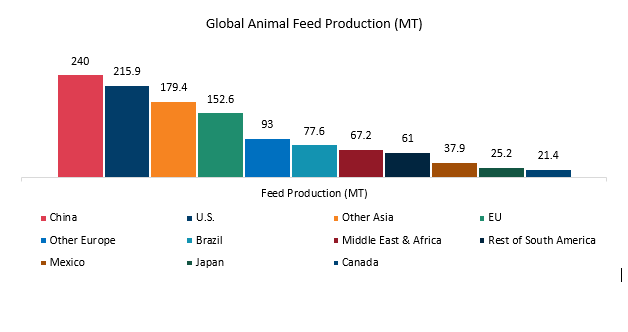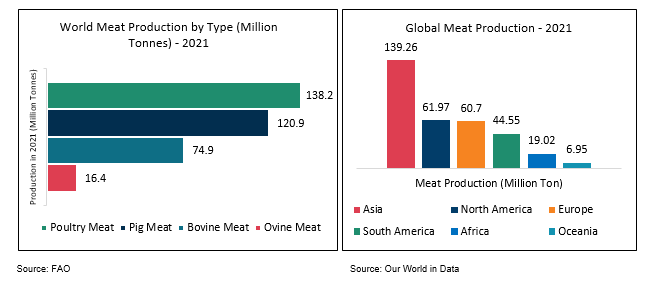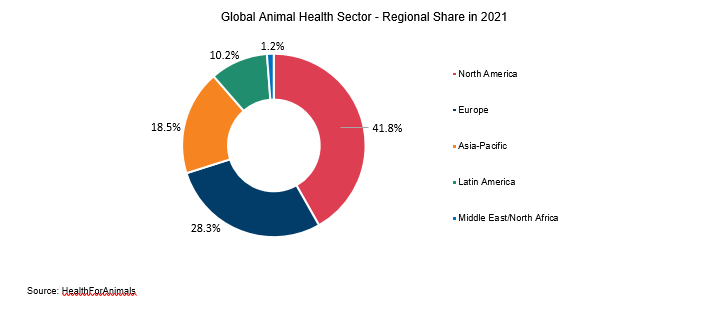Animal Nutrition & Health

Animal nutrition sector focuses on dietary needs of animals that are used as agriculture livestock and in feed industry. Animal feed refers to the production of feedstuff for animals such as broilers, pigs, chickens, cows, horses, pets, among several others. Feed constitutes the major expense associated with output, typically exceeding 50% of total costs involved in livestock production systems.
Animal nutrition & feed includes vitamins, carotenoids, enzymes, conjugated linoleic acid (CLA), etc. The presence of such ingredients in animal feed keeps them healthy. Medicated feed which contains FDA-approved animal drug, can also be served to animals. Such feed helps animals in treating, controlling, or preventing a disease, or to improve the animals’ growth and productivity.
According to International Feed Industry Federation (IFFI), the estimated volume of world compound feed production touched 1.0 billion ton in 2020. And, global commercial feed manufacturing generates an estimated annual turnover of over USD 400 billion. The U.S. and China were the major producers of animal feed in 2020.

Increasing meat consumption is a primary reason for the growth of animal feed industry. Globally, in 2023, over 78% of the population consumed meat. As per FAO, in 2021, poultry meat is the most produced meat globally, and estimated to reach 143 million ton in 2023, with much of the growth expected to be concentrated in the United States.

Digitalization in Feed Management
Digitalization in feed management is the integration of digital technologies such as IoT and data analytics for livestock feed management. Such technologies help the livestock producers to optimize their operations with lesser wastage, lower impact on environment, and lower operational costs. Rising trend among producers to use mobile phones installed with feedstock management apps to monitor their livestock will offer improved feed management.
Functional Feeds to Optimize Nutrients
Functional feeds are enhanced with additives that induce physiological benefits to livestock and enhance their immunity and overall health. It promotes their growth and health by improving their digestibility and the immune system along with antimicrobial, anti-inflammatory, antioxidant properties. Functional feeds such as amino acids & enzymes, medium chain fatty acids, oligo- or polysaccharides or polyphenolic acids promote intestinal function, metabolism and the immune system. This helps in improving animal health and lower the risk of any disease that may attack the livestock.
Animal Health is Directly Proportional to Human Health
There is strong demand for milk and milk products globally. An unhealthy animal can cause disease to end-consumers, hence, animal health is crucial for human health. Animal health industry is adopting digital technology for early detection of diseases and individually targeted treatments. This can bring several benefits for animal health and help support sustainable development. A 60% global vaccination rate for beef cattle correlates to a productivity rise of more than 50%, as stated by HealthForAnimal.
Predictive technologies like AI and machine learning, can bring customized care plans for individual animal. Smart collars and sound monitoring system with monitoring technologies enables real-time monitoring of health by tracking vital signs such as temperature, water consumption, feed rate, activity, reproduction and disease indicators, etc. As per HealthForAnimals, a global animal health association, in 2021, North America captures over 40% share of the global animal health sector.

The Rise in Pet Adoption
Globally, there is rise in pet adoption. Animals such as cat and dog are the preferred pet choice of adopters and there is rising investment by owners to keep pets healthy and safeguard the neighborhood. China, the U.S. and Europe are the major pet markets. In 2021, the U.S. consumers’ total spent was over $120 billion on pet’s wellbeing.
 With the evolution of animal diseases, research institutes are continuously developing newer methods that can provide better ways to prevent and recover animals from deadly viruses. The latest mRNA vaccine provides a genetic code which act as instructions for the animal brain, showing the immune system the path to recognize the disease, how to make protein, and displaying on cell’s surface to fight the disease.
With the evolution of animal diseases, research institutes are continuously developing newer methods that can provide better ways to prevent and recover animals from deadly viruses. The latest mRNA vaccine provides a genetic code which act as instructions for the animal brain, showing the immune system the path to recognize the disease, how to make protein, and displaying on cell’s surface to fight the disease.
In veterinary medicine, gene editing, advanced pain management, micro-biome manipulation, improved reproductive technologies such as artificial insemination (AI) and embryo transfer (ET) are the latest trends in veterinary medicines.
Our consultants at Intent Market Research possess understanding of the evolving animal nutrition & health sector and can provide holistic view on the future industry growth scenarios

